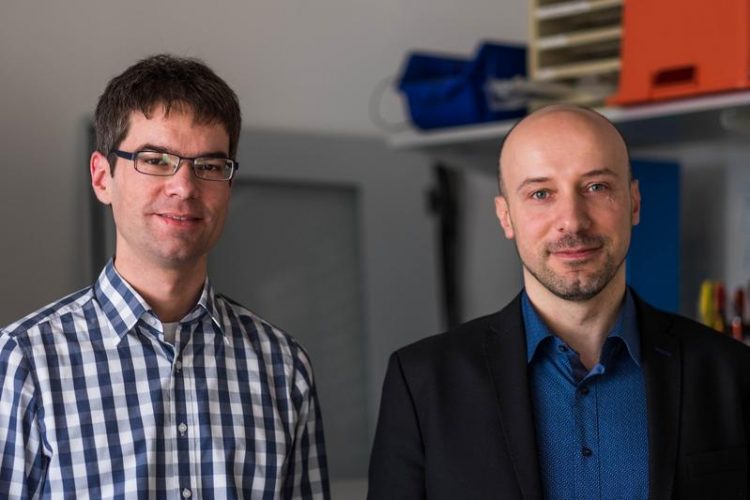Computer scientist receives Google Research Award

Professor Samuel Kounev (right) and doctoral student Simon Spinner. (Photo: Vera Katzenberger)
Downloading your favourite song, streaming a popular movie or shopping online – we are using a great number of online services on mobile phones, tablet computers or PCs. Every day servers in data centres run at the capacity limit to process the requests by users.
According to Samuel Kounev, Professor of Computer Science at the Julius-Maximilians-Universität Würzburg (JMU) in Bavaria, Germany, servers are presently working inefficiently. He has a vision: systems capable of predicting high demand that prepare for such load peaks and shut themselves down when demand is low.
The Internet as a climate killer
“Today, there are huge data centres worldwide in which the majority of servers are not used to capacity. However, these servers must be permanently ready to respond to possible requests by Internet users,” Kounev explains. This drives operating and energy costs through the roof. Especially servers in data centres are responsible for a significant amount of carbon dioxide emissions. “On a global scale, data centres produce about as much CO2 as air travel.“ And this is too much.
With research assistant, Simon Spinner, he has been studying how servers can be used more efficiently to enable resource-saving Internet usage for quite some time. Google also believes in the promise of sustainable Internet usage in the future and rewarded the project with its Google Research Award in autumn 2015.
The award comes with a prize money of 63,000 euros. Some 800 research teams had presented their projects to a jury. Besides Harvard University or Stanford University, the jury was also convinced by the research work of the JMU computer scientists. A total of 113 projects worldwide are sponsored through a Google Award.
Always one step ahead of Internet users
For servers to work more efficiently, it is necessary to forecast load peaks. “Instead of waiting for systems to respond to increased demand as in the past, we are trying to develop methods that can reliably forecast such peak periods and provide the corresponding resources,” Simon Spinner explains.
Together with Kounev, the doctoral student works on combining existing statistical methods to estimate resource consumption to enhance their reliability and accuracy, because each method has its strengths – and estimations do not always deliver reliable statements as to the actual resource consumption.
The scientists baptised their newly developed IT tool “LibReDE” which enables better prediction of resource demands. The programme is available as open source software. With their research, the Würzburg scientists have accomplished important pioneering work in this field. Because in the past, the individual methods had to be selected manually in a time-consuming and error-prone process.
Close cooperation with partners in Silicon Valley
Kounev and Spinner had regular phone conversations with their partners in Silicon Valley to deliberate about new ideas or research approaches. According to Kounev, the cooperation is a win-win situation for the University of Würzburg and for Google: “The high prize money allows us to finance new research positions and equipment to fully concentrate on our work.”
At present, the computer scientists are working on testing their methods in practice in a case study with Google. “It would be the crowning achievement of our work to use our tools on data of Google servers,” Spinner says. Until then, however, various legal concerns need to be eliminated: First all data have to be anonymised before the case study can be conducted. The Franconian research team is optimistic to start first practical tests with Google soon.
Contact
Prof. Dr. Samuel Kounev, Chair of Computer Science II (Software Engineering) of the Julius-Maximilians-Universität Würzburg, JMU, Phone +49 931 31-82452, samuel.kounev@uni-wuerzburg.de
http://descartes.tools/librede The LibReDE tools is available as open source software
http://se.informatik.uni-wuerzburg.de/news/single/artikel/google-research-award/ Cooperation of the Würzburg computer scientists with Google
http://googleresearch.blogspot.de/2015/08/google-faculty-research-awards-summer…. More about the Google Research Award
Media Contact
All latest news from the category: Awards Funding
Newest articles

Superradiant atoms could push the boundaries of how precisely time can be measured
Superradiant atoms can help us measure time more precisely than ever. In a new study, researchers from the University of Copenhagen present a new method for measuring the time interval,…

Ion thermoelectric conversion devices for near room temperature
The electrode sheet of the thermoelectric device consists of ionic hydrogel, which is sandwiched between the electrodes to form, and the Prussian blue on the electrode undergoes a redox reaction…

Zap Energy achieves 37-million-degree temperatures in a compact device
New publication reports record electron temperatures for a small-scale, sheared-flow-stabilized Z-pinch fusion device. In the nine decades since humans first produced fusion reactions, only a few fusion technologies have demonstrated…





















